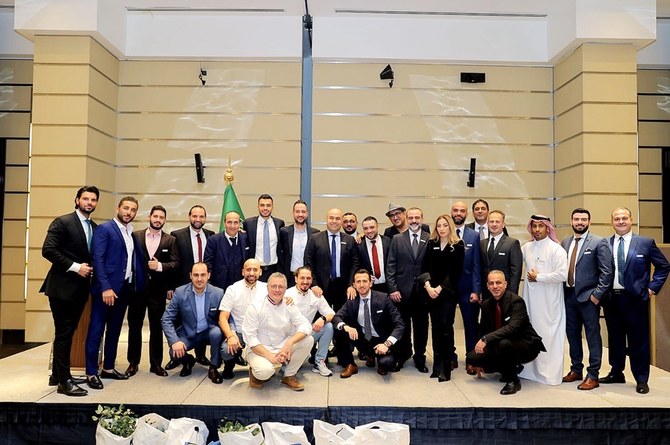The Belgian Embassy in Saudi Arabia, in coordination with Belcolade, a major international chocolate manufacturer for the professional market, and BanoPuratos, a Belgian-Lebanese manufacturer and supplier of raw materials, utensils, and machinery used in the chocolate, bakery, pastry, and ice cream industries, recently celebrated “Belgian Chocolate Night” in Riyadh.
The annual event aimed to celebrate chocolate, Belgium’s most famous product, while also mobilizing efforts to promote the values of sustainability and environmental preservation in cocoa cultivation.
Held at the Hilton Riyadh Hotel, the event was attended by Andrej Barth, consul of Belgium in Riyadh, as well as a number of government officials, members of business councils and other economic sectors, and media professionals from various public and private organizations.
The ceremony saw the unveiling of a 3.5-meter-tall chocolate replica of the Tuwaiq Mountains in Saudi Arabia, weighing 150 kg. It was created by the famous chef Stephan Leroux. The BanoPuratos group was inspired by the wise words of Crown Prince Mohammed bin Salman: “The Saudis’ strength is like that of the Tuwaiq Mountains, unbreakable, unless this mountain is leveled and equaled to the ground.”
The Belgian consul spoke highly of the distinguished and constantly evolving relations between Saudi Arabia and Belgium, reaffirming his country’s commitment to further strengthening its ties with the Kingdom.
He stressed that the investment environment created by Saudi Arabia, together with the Kingdom’s advanced legislation, has been a major factor behind attracting Belgian companies to Saudi Arabia in order to make the best use of their expertise to build a sustainable investment base.
FASTFACT
The ceremony saw the unveiling of a 3.5-meter-tall chocolate replica of the Tuwaiq Mountains in Saudi Arabia, weighing 150 kg.
Barth said that the Kingdom is a world leader in establishing the values of sustainability at all levels, expressing his happiness at supporting Saudi Arabia in this field, where 57 percent of Belgian chocolate carries a sustainability label.
According to the Belgian Consulate in Riyadh, Belgium produces 700,000 tons of chocolate per year, 80 percent of which are exported.
Mohammed Hashwi, CEO of BanoPuratos Group, said the group has chosen Riyadh as a preferred destination to celebrate “Belgian Chocolate Night” for many reasons, including the fact that Riyadh is the “capital of good taste,” in addition to being a leading city for hosting major entertainment events.
He noted that Saudi Arabia was the world’s 11th largest importer of chocolate, as its chocolate imports in 2020 amounted to $569 million.
“According to a recent study conducted by the strategic consulting and market research firm Report Ocean, the Saudi chocolate market is expected to grow at a compound annual growth rate of 4.5 percent between 2022 and 2028. Saudi Arabia is the Middle East’s largest market for chocolate and its products, reflecting Belcolade’s strong interest in the Saudi market, as it enjoys a high taste that recognizes the value of fine chocolate,” Hashwi added.
Meanwhile, Tamam Al-Nesouli, general manager of the Sweet Mix Company, a BanoPuratos Group affiliate in Saudi Arabia, spoke about the challenges facing the cocoa tree. He said that BanoPuratos is keen to play its full part in enhancing the sustainability of this plant in order to provide the best types of raw materials for manufacturers and produce additive-free, healthy products.
“The group also launched the Cocoa Trace Program to create an ideal environment in which cocoa farmers can gain the knowledge and skills they need to better manage their farms and preserve the environment. They were taught how to adopt proper scientific methods for the cultivation of cocoa to confront the different challenges they face,” he added.
As part of the company’s commitment to social and environmental responsibility, the ceremony included a presentation on the Cocoa Trace Program, highlighting its role in supporting sustainability in the chocolate industry and how it contributes to preserving the environment, as well as financing the construction of schools, healthcare centers, wells and rainwater tanks in cocoa-producing countries.
















